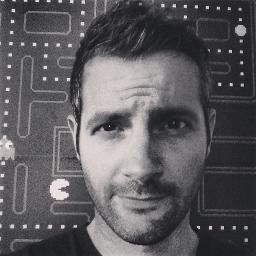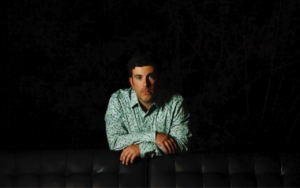Many music industry books and blogs tell you that you’ve got to be single-mindedly focused when pursuing a music career. Think, live, breathe, and dream music. Remove all hurdles and distractions. Give it your all.
But success comes in many forms, and nowadays it’s possible to have a fulfilling music career while also staying active in other pursuits and careers — to say nothing of maintaining a family or a solid long-term relationship.
DJ/producer Daemon Hatfield falls into the later category. As a content creator for a hugely popular video game news site, he’s been able to find opportunities to connect his day job and his music career, boosting his profile in both arenas.
With almost 50k followers on Twitter and 6k followers on Soundcloud, Daemon has obviously found a way to offer something of value to two different demographics (music fans and video game fans) without diluting his “brand,” which he describes as something of a venn diagram — where electronic music and video games overlap.
I asked Daemon a little bit about those two careers and how they fuel one another, how he promotes himself through social media, and his usage of teaser videos to build his audience. Here’s what he had to say.
An interview with electronic music artist Daemon Hatfield
CR: The first thing I’m curious about is how your work at IGN (a video game and entertainment news site) and your music career fuel one another? Is there an obvious “crossover” audience between gamers and fans of electronic music? Did you ever feel the pressure to separate those two things, or to present them separately in terms of… Twitter, your online profiles, etc?
DH: Well, I create a lot of videos for IGN and do some editing, so that gives me opportunities to place my music. It can be a good way to try out tracks I’m working on, too. If people notice it and it gets a good response that usually tells me I’m onto something.
Of course, being in a highly visible position like I am at IGN gives me a lot of opportunities to expose people to my music. I realized a while ago that my “brand” is something like a venn diagram where video games and electronic music overlap, so that’s the persona I go with and don’t try to separate them. I think of Twitter as another content distribution platform not entirely dissimilar to IGN — a place where I provide video game and music content for my fans. And cat content.
So, what exactly do you do for IGN? How does that platform give you the chance to get your music in front of a new audience?
I’m a host and producer, so I appear on camera and oversee the production of certain video series like my video game talk show, Game Scoop! It’s nice because when I need music for a video, instead of using Killer Tracks I usually have something of my own that works. If I notice people in the comments asking about the music, I can always point them to my website or SoundCloud.
Do you ever license your music for games (or film, TV, commercials, etc.)? If so, what was the placement process like?
I’ve licensed songs for a few video game trailers. It’s usually a situation where the music for the game isn’t ready, yet, but the developer wants to cut a trailer and reaches out to me for something suitable. I definitely want to do more with licensing. It’s on the to-do list.
What is your background in music (both influences and your previous experiences at recording/performing)?
I started writing dumb little songs when I was in elementary school and had parents that encouraged it. I went from performing in musicals to playing in a band to getting a degree in music composition from the University of Kansas. Post-college I was inspired by the whole laptronica/bedroom producer thing and started recording songs on my own at home. I’ve been releasing music commercially for ten years now.
I think my influences change over the years, but a constant is definitely synths and drum machines. They can instantly transport me to a great place. I like music that you would want to listen to while looking out the window of a train. Right now I’m very inspired by what’s going on with chillwave and I love trap drums.
What’s your current recording setup? What software, vintage synths, drum machines?
I use Reason to produce all my music and have since 2001. It’s what I started producing with and it feels like home to me. Within Reason I’m not using the built-in synths that are common these days. Instead, I’m using Rack Extensions like Rob Paben’s PredatorRE and the Synapse Antidote.
I know a lot of producers really like collecting gear but I’m kind of the opposite. I prefer to work as economically as possible with the least amount of gear (and clutter) as I can get away with. So I have an iMac running Reason and an Novation Remote 25SL for a midi controller. I have a Gibson Flying V for guitar and a decent condenser mic for vocals, but that’s about it.
Before I was producing music on a computer I was writing songs on a guitar for years, so that may be why I tend to eschew piles of gear.
Do you make your sessions freely available for remixing?
I haven’t, yet, but I’m not against it. If there was interest I totally would.
What’s your DJ setup?
I’ve been using CDJs and a mixer for several years, but right now I’m experimenting with Native Instruments’ Traktor and a Traktor Kontrol S2 MK2. Again, I like to travel with as little gear as possible.
How does your approach to your music in a live set differ from your objective/technique when recording?
When I’m DJing I like to play really high-energy, bass-heavy tracks. But my own music seems to always turn out more on the mellow side for some reason. So I kind of think of them as two personas: the DJ and the producer. Maybe one day they’ll be more in alignment, but writing moody, melodic songs just comes more naturally to me than crafting straight-up dance music. I think I’m getting better at it, though. My new record, Beyond the Darkness, has my most danceable tracks, yet.
Someday it would be nice to have a band again and play my pop/rock songs live.
Does your Nintendo Power oven mitt help you bring special magic to the kitchen?
I love the Power Glove. It’s so bad.
How much emphasis do you put on music videos — and why?
I haven’t created a fully-produced music video, yet, but all my most popular songs are on YouTube, which I think is of utmost importance now. Even if it’s just your song with static album art, that’s better than not being there at all. It’s where people are listening to music today.
Lately I’ve been creating teaser videos for my new releases, which have been well-received and are useful for building awareness. I have very modest video editing abilities so I can cut together something attractive and get people talking. Then posting a full song later with maybe a lyric video provides another promotional opportunity.
What would you say has been your biggest promotional success with music?
I have no idea how he discovered it, but Drew Carey tweeted a link to my song “Good Morning California” to his almost 650k followers with a nice little note. That was an unexpected but very welcome bit of promotion.
You’ve built up a great following on Twitter. What’s the secret?
I don’t have a secret, I just try to make sure what I’m posting is in the service of my followers. Before posting something I ask myself, “Will my followers find this valuable or entertaining?” Just like I do at IGN, I try to post engaging content that people will enjoy. And I respond to as many people as possible.
Similarly, you’ve gotten a bunch of plays and interaction on SoundCloud. What’s been your approach to sharing and distributing your music — on SoundCloud and beyond?
Promotion is a long-term plan that steadily spreads out across all social media. I might announce a new EP on Twitter, then a day or two later post the first single on SoundCloud. Then I can post a link to my SoundCloud on Twitter. Then I can post the video to YouTube, and so on. There are so many avenues for promotion now it kind of never ends. But I try to treat each platform with respect and exploit what makes it unique.
Speaking of distribution, what led you to working with CD Baby?
It is amazing to me that my music today is available to pretty much anyone in the world. Distribution services like CD Baby are what make what I do possible. Otherwise it would just be my cat listening to my tunes.
How important is your website in your overall online presence? What has your experience been like with HostBaby?
I appreciate how easy it is to get an attractive website up and running with HostBaby. Twitter, Facebook, Youtube… All those places are very important, but it’s also really nice to have a place on the internet you can call your own and have complete control of.
Do you have any predictions for the future of independently produced and distributed music? What effect will the popularity of streaming have on music-makers?
Streaming is here to stay, so music makers should probably make peace with it. I don’t have a magic 8-ball or anything, but I think the future for us involves a lot of tiny revenue streams. A stream from downloads, one from streaming, one from YouTube, one from sync placements, one from live shows… The more you can diversify, the better.
What’s next for you, both in music and at IGN?
My new instrumental album, Beyond the Darkness, came out on 2/18. Then I’ll continue work on Black Cloud Vol. 2, my collaboration with friend and lyricist Ryan Geddes, which is coming along nicely. Over at IGN I’m ramping up my show Game Scoop! The world of video games is very exciting right now as we just launched a new console generation which brings exciting new technology and gaming possibilities, so there is a lot to talk about. Lots of opportunities on the horizon, both for gaming and for music!


